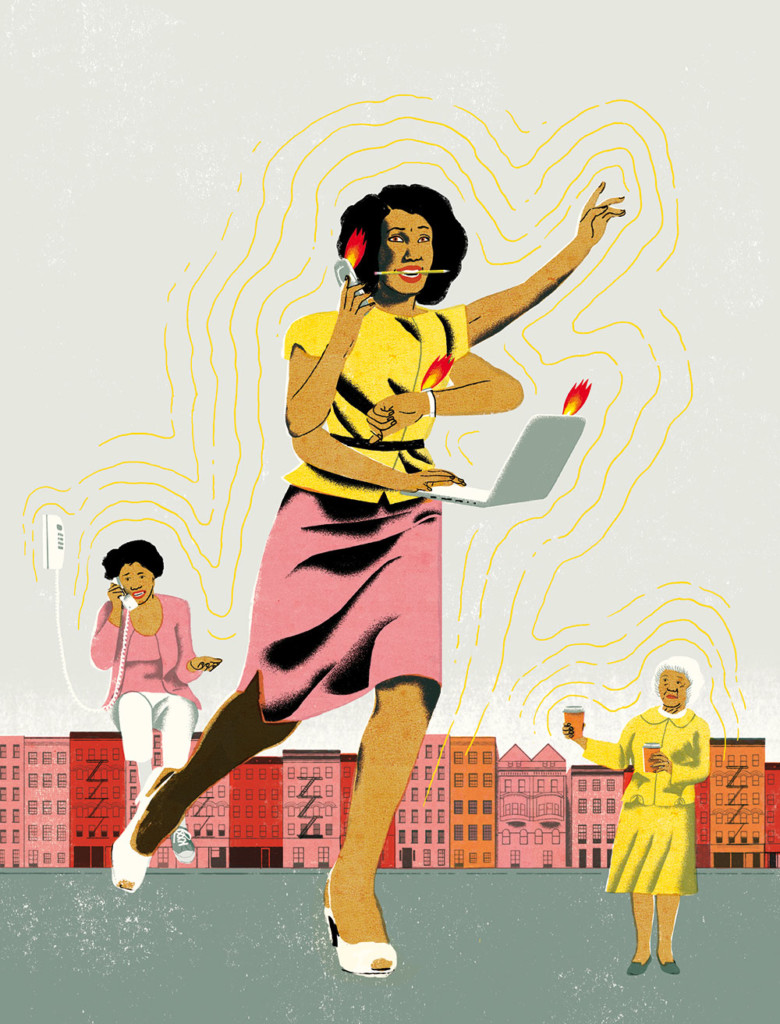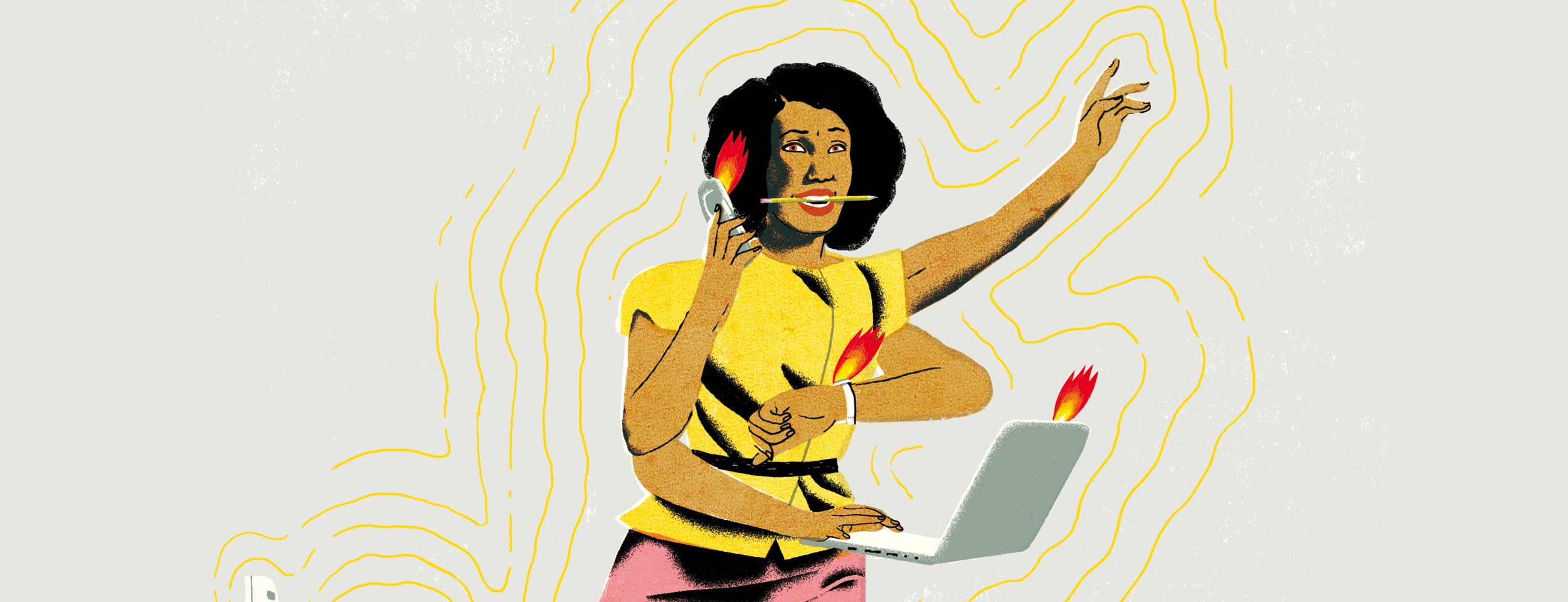A year ago, shortly after newly minted President Trump signed an executive order barring people from some Muslim countries from entering the United States, I was at home when my editor emailed a group of reporters I worked with at the time. Thousands of protesters had flooded New York’s John F. Kennedy Airport, where people attempting to enter the country had been detained, and one of us needed to hop on a train and get there. I felt stuck in a very familiar way; a few years earlier, as I was working from a coffeeshop in New Orleans while on assignment, a grand jury in Staten Island declined to indict the police officer responsible for Eric Garner’s death. My body was hot with anxiety then, as I wrestled with my responsibility to the assignment and my own personal rage.
A good friend of mine—a writer, a woman of color, a Muslim immigrant—got in touch to say her mother was due to land in New York that evening. She was terrified for her mother’s safety, and I was, too, so we spent much of the day exchanging anxious text messages, glued to Twitter and the news. I decided to take a pass on the JFK assignment and, feeling like a bad journalist, headed over to my friend’s apartment. We sat in the living room on the floor as the sky darkened, stress-eating Cheetos until our fingers turned orange, and waited.
ICYMI: “NDAs are enormously controversial, even within the legal community”
The feeling I’m left with at the end of a frenetic 12 months reminds me of the 2013 radio documentary by veteran war correspondent Kelly McEvers. In the documentary, Diary of a Bad Year, she chronicles a violent, dangerous year for journalists working abroad. McEvers—who found herself uncharacteristically emotionally volatile, crying uncontrollably—repeatedly ran headfirst into the firestorm, recorder in hand, against her better judgment.
The symptoms of trauma and exhaustion she described feel familiar, and her central question—why am I doing this?—is one I repeated to myself that night last year, and many nights since.
Burnout has long occupied a kind of mythical, worst-case scenario, future destination in my mind. It was a condition that would be met only by those unlucky few with bad bosses, bad assignments, bad luck. It was a threat that seemed credible only if I took obviously dangerous assignments. Education reporting? Covering the media? How could I be burnt out on those beats, and so soon?
My narrow understanding of work-induced burnout among journalists mirrored the way the industry has, until recently, treated the issue. Anthony Feinstein, a professor of psychiatry at the University of Toronto, says male-dominated newsrooms for years regarded threats to reporters’ mental and emotional health as “a sign of weakness or personal failure.”
Burnout has long occupied a kind of mythical, worst-case scenario, future destination in my mind.
“There was a little of this sense that if you couldn’t cut it, you weren’t suited. That’s changed to a large degree,” says Feinstein, who has authored a dozen studies looking at how threats to personal safety traumatize reporters working in difficult circumstances. Feinstein’s most recent research focuses on local journalists working in places like Mexico and Kenya who, unlike their Western counterparts, can’t parachute home to safety after they get the story.
When I entered the profession in 2014, the old “suck it up and do your job” attitude still reigned, and it was a lesson familiar to a black girl with a career Army officer for a father. For some of us, sucking it up and doing your job was as much part of a stoic professional climate as it was a proven survival tactic, at work and in the world.
ICYMI: Can BuzzFeed afford to keep funding BuzzFeed News?
So when I arrived in my first newsroom amidst a news cycle oversaturated with an endless loop of unarmed shootings of black men, boys, women, and girls, I found myself relying on those old norms and suffering in silence, leaving my fatigue—and the guilt I felt for feeling it at all—unaddressed. I had no ability to translate for my coworkers, all of them white, what it was like to watch videos of black people being shot by the police go viral, and to flinch when a police car inexplicably slowed to a creep alongside me, the officers staring, or how that put me in a fog that made doing my job difficult the next day. And as the country’s focus shifted, as it is known to do, away from black death and toward Trump, that lethargy began to snowball even more quickly, as a volatile administration transformed the news cycle yet again. That lethargy has now gone mainstream.

Illustration by Sonia Pulido
I suspect I’m not alone in feeling trapped in the news cycle. Most days, even a brief step away from a laptop or television can put a casual reader of the news far behind; as a media reporter, it severely inhibits my ability to do my job, even as it damages my health. With every ban, every policy threat, every protest I covered, every executive order, every press conference (the entire newsroom plugged in, our eye rolls almost in sync), every alarmist headline, every controversial tweet and the inevitable backlash—I became increasingly exhausted and void of any energy to actually do my job. I’d spent it all just trying to keep up.
I began to see my body change. Phantom pain in my abdomen that I developed several years ago (after many tests, doctors told me it may be stress-related) returned and surfaced on a near-daily basis. I experienced my first anxiety attacks from inside bathroom stalls. My mom took to reminding me to eat, because skipping meals had become a habit. I stopped exercising. I gained weight. I went to urgent care more times than a healthy person reasonably should, paranoid that something was wrong with me. Perhaps my overreactions weren’t so ridiculous; the vertigo of being unable to read yourself, unwilling to trust your mind’s understanding of the state of your body, is a displacement difficult to reckon with.
At the beginning of a new year and a new news cycle, maybe the willingness to be publicly not okay will help us manage until we are.
I asked my friend Amber Jamieson, a breaking news reporter at BuzzFeed, to help me understand when my behavior began to shift. I first met Amber in 2013, and I still speak to her daily. One of the first things she noticed was how difficult it became to get me to go outside when I didn’t have to.
“I got worried about how often you spent weekends the last year inside your house,” she told me in late December. “And sometimes when we are hanging out, you basically spend the whole time on the phone and I’m like, ‘What’s happening here?’ Later I realize it’s because you’re feeling super anxious.” She spent some time scrolling through our 2017 text log, where we’d recorded reactions to the news in caps lock, our daily injuries and defeats, and more than a few memes. “I definitely get the feeling reading back on these that you were very, very anxious around [the] election,” she told me. “There’s been a lot of ‘Do I even want to be a journalist?’ chats between the two of us in the last year.”
The day after the election, I began a conversation with Amber describing how I’d just spent 20 minutes holding my colleague, a woman of color, in her office as she wept. The newsroom at the Village Voice, where I worked at the time, usually a flurry of motion and sardonic humor, was despondent and eerily quiet. “Today has been so weird and bad. I have done literally no work,” I wrote.
I asked my mom whether she’d noticed any changes in me over the past year, and she said the biggest had been the dramatic politicization of our everyday conversations. Being a black woman in America has always been political, but now every other part of my identity was political—including my job, made so by a president as obsessed with us as we are with him. Those conversations, she said, were sometimes defeatist and full of fear. In the spring, I became aggressively involved in what would become contentious union contract negotiations at the Voice, just as fears and fights about the repeal of the Affordable Care Act and tax reform were stewing.
“I think one of the reasons you participated in Voice union stuff had to do with where you were at that time—we were so afraid. It was [you] grabbing hold of those areas you could grab hold of, and trying to keep the inevitable from happening,” my mom said. In those same months, I watched a friendship of mine deteriorate, in part because of my inability to be present during my friend’s time of need while communicating my own pain to her. I handled a necessary, but rough romantic breakup terribly for the same reason. Last year was a year of takebacks, and that spirit of loss began to seep into my relationships in a way that often felt unbearable. And as stories of sexual harassment in the media continue to dominate our collective attention, I fear that my involvement with reporting on these issues is responsible for the sluggish shell I sometimes feel myself withdrawing into.
Feinstein offers some practical advice for me and everyone else fighting burnout: Make time for your friends, exercise, take a step back if you notice your relationships outside of work beginning to break down, and reach out to colleagues if you notice them beginning to withdraw.
When I think about all the dysfunction that has defined the political climate over the past few years, the space I’ve found the most comfort in has been in the thick of what feels like a collective, cathartic acknowledgement of our exhaustion. After weekends I spent holed up, I’d return to a group chat or a Slack channel or a happy hour and learn that everyone else had felt like crap, too, that it wasn’t just me, that there were many things wrong and not all of them were self-inflicted. This has been a refuge. These havens are often dripping in sarcasm and self-deprecation and, sometimes, alarm and anger—on Twitter, in bars, in the newsroom breakroom. But at the beginning of a new year and a new news cycle, maybe the willingness to be publicly not okay will help us manage until we are.
Alexandria Neason was CJR’s staff writer and Senior Delacorte Fellow. Recently, she became an editor and producer at WNYC’s Radiolab.


